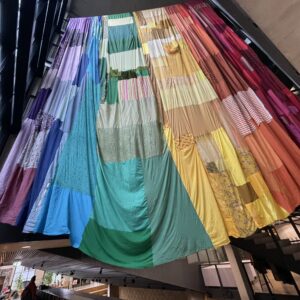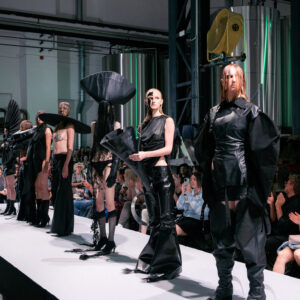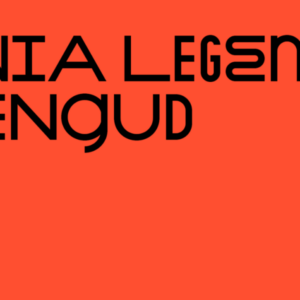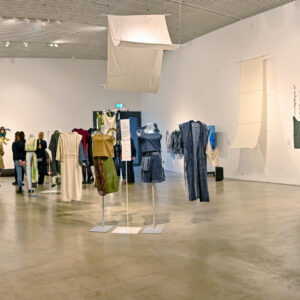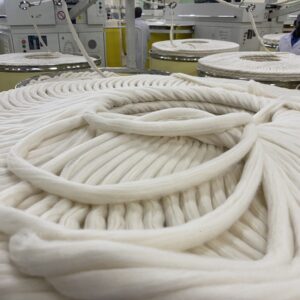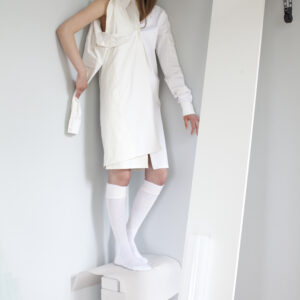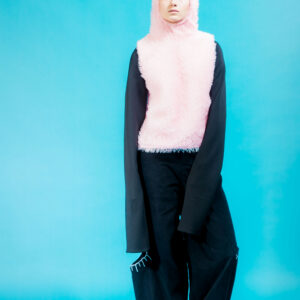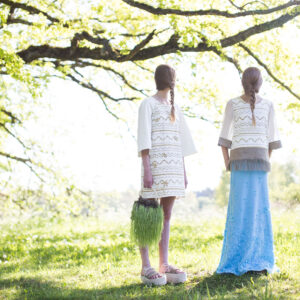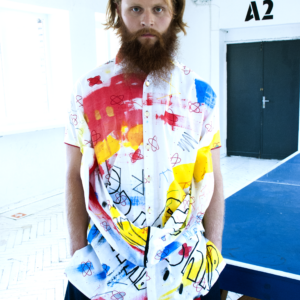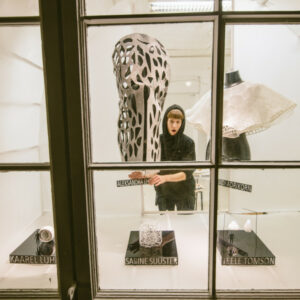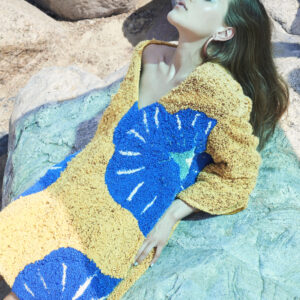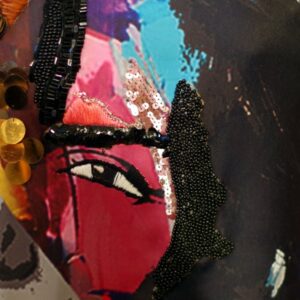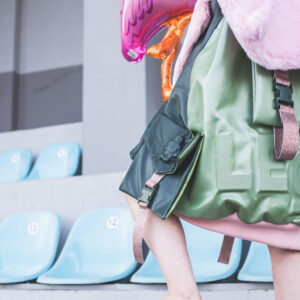Fashion Design
The Fashion Design department trains top professionals for the fashion industry.
The Fashion Design department is the leading voice for clothing design and its related fields in Estonia. Fashion is a creative field that most vigorously deals with the form of the human body while also combining other disciplines. The program offers a wide-ranged design education, while persistently working with traditional fashion, its interpretations, innovative technologies, practical collaborations, active critical thought, sustainable modes of thinking and more.
The department eagerly examines material usage cycles and investigates new materials and methods to apply in future fashion design. The cultural sustainability developments involving innovation in traditional techniques and meaningful inclusive actions outside the university are of great importance. The department supports creativity in fashion, contributes to young talents’ exhibition activities and participation in international competitions, and supports them in taking an active role in society.
Traditions & ERKI Fashion Show
The strongest asset of the fashion department is its long-lasting continuity. Fashion education has been taught at the Estonian Academy of Arts for over 80 years, which makes EKA one of the oldest providers of fashion education in Europe. The beginnings of the department can be traced back to the times of the Women’s Handicraft Workshop, which was established at the Tallinn City Industry and Art School. The department grew out of the costume design program of textile education in 1940, 7 years earlier than the legendary Aalto University in Finland. Even during the tumultuous 1940s, the continuity of the department was ensured – the Estonian SSR State Art Institute (ERKI) was reportedly one of the few higher education institutions in the Soviet Union that trained costume designers in the 1950s. Quality education was sustained even then. The transformation of ERKI to EKA brought new opportunities to students and academics alike. Throughout the years an integral part of the departments DNA has been the ERKI Fashion Show – a playful performance and social event which was started by students in 1982. The first events reflected the protest-mindedness of young people at that time. Today, the initiative has grown into an annual fashion event for young talents, edging on performance art, which excites the audiences to this day. Integral to the fashion department’s identity are topics concerning sustainability, which the department is a pioneer of. This is embodied by the Sustainable Design and Materials Lab (DIMA) which grew out from topics raised by Reet Aus in the 2010s.
How does learning take place?
Specialized education takes place in studios and workshops, where support and guidance create a favorable environment for individuals to experiment and achieve outstanding results. The exceptional 1:3 ratio of teachers to students is one of the uniquest and smallest in the world. Students connect with high-level lecturers, instructors, recognized design and applied arts practitioners, creative researchers, and companies through lectures and workshops. This along with international exchange programs and internships provide excellent opportunities to promote students’ careers at both local and international levels. During instructive classes, students acquire knowledge of contemporary technology and material culture, design theories and methods, and gain skills to integrate them into the creative process. Altogether students learn the entire design process, from the idea to the finished product.
Connecting entrepreneurship
The department closely collaborates with companies. During the studies, trips to businesses are organized both in Estonia and abroad, which are complemented by visits to international fairs. Students solve real problems by working with companies and students from other fields. The projects provide young designers with the necessary problem-solving skills, real work experience, and an opportunity to see their creations as tangible finished products. Additionally, companies act as internship bases, which give students a direct opportunity to familiarize themselves with institutions from the inside and – based on successful joint projects – move to work in the corresponding companies.
In-depth look at the curriculum
It is possible to study Fashion Design at the bachelor’s level. A broader development of skills can be continued in master’s studies.
The bachelor’s curriculum includes subject-specific courses, basic studies, general studies, elective courses, and professional internships. The content of subject-specific courses is constantly updated to meet the expectations of the society and the needs of the labor market. The theoretical and practical outcome of each course project is the materialization of a design idea and the presentation of the author’s creative work. As important are the discussions concerning creative processes and the application of alternative forms of creativity in the design process such as digital media. The program places great emphasis on trips abroad, where students get to know the international fashion scene, exhibitions, the design culture and art landscapes.
The bachelor’s program lasts for three years and culminates in the creation of an author’s collection or concept, a portfolio and a public defense. More details about the program HERE.
At the MA level, students can focus on circular design, social design, or a chosen crafts’ in-depth development. In the newly updated two-year master’s program, emphasis is placed on interdisciplinary work, innovation, teamwork, as well as taking into account the needs of different target groups and developing a deepened sustainable mindset. You can find more information about the master’s programs: Craft Studies and Interaction Design
Where do graduates work?
Fashion design education is broad-based and provides a wealth of knowledge for entering the job market. Graduates of the department work as fashion designers, fashion illustrators, and editors, marketers, stylists, costume designers, tailors, display coordinators, buyers, creative directors, fashion business developers, brand managers or innovators who speak on sustainability issues or engage in the development of new materials. Bachelor’s graduates most commonly start as junior designers. Those who have completed a master’s degree are ready for professional fashion artist work, as well as roles as problem solvers associated with sustainable design processes in both creativity and entrepreneurship, or even academic careers as teachers or creative researchers in the field.
Fashion education supports the development of a personal design philosophy and the cultivation of creative, independent, and ambitious designers, ensuring graduates’ international competitiveness. Thanks to excellent preparation, graduates of the department work for international brands such as Louis Vuitton, Balenciaga, Cacharel, H&M, Tiger of Sweden, Ivo Nikkolo, Monton, Baltman, among others. Many designers also run their own brands, such as Marit Ilison, Lilli Jahilo, and Katrin Kuldma (Amanjeda).
Follow our activities on Instagram @eka_moedisain and Facebook!

